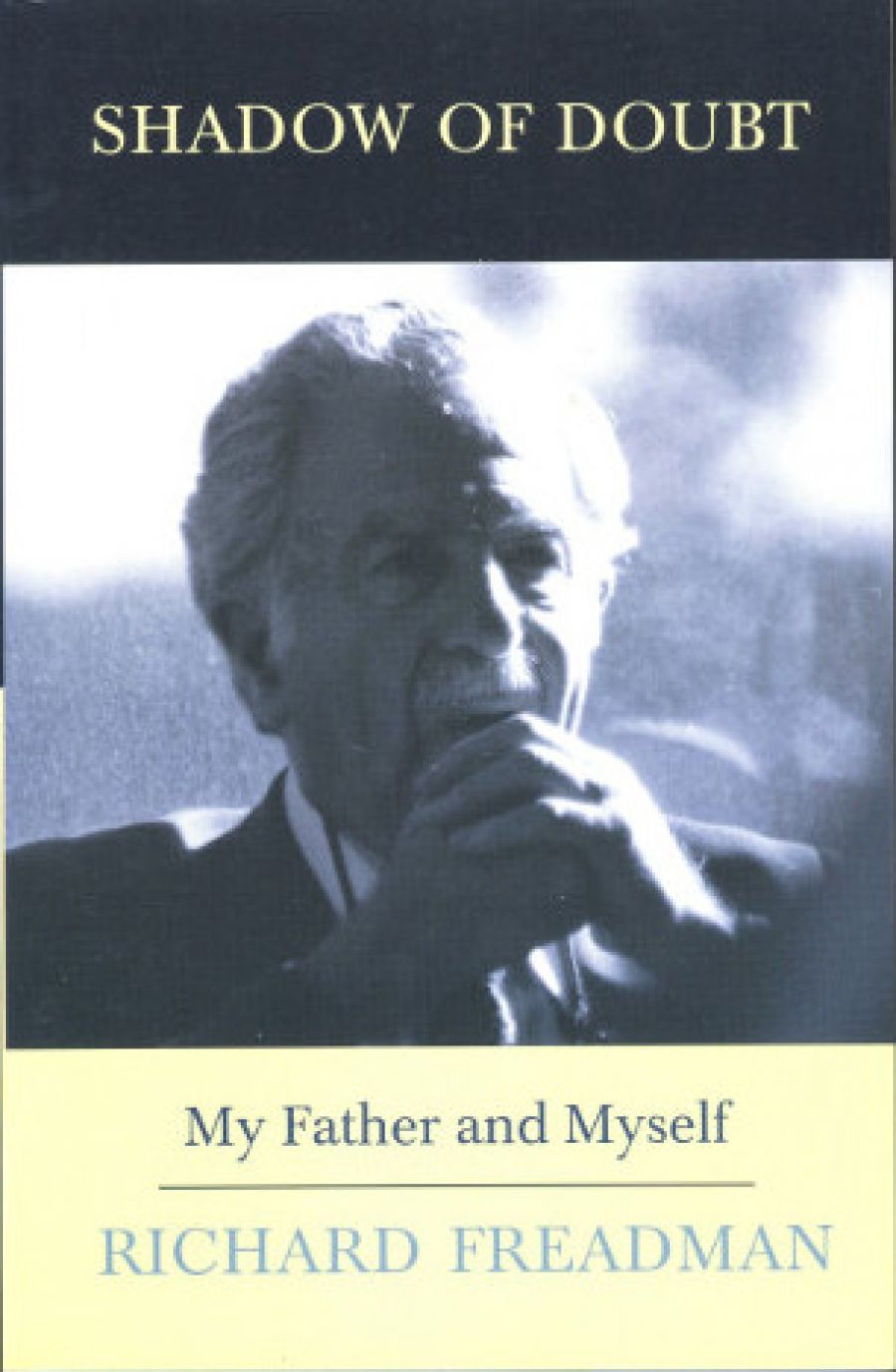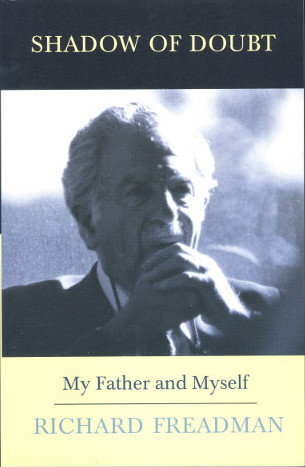
- Free Article: No
- Contents Category: Biography
- Review Article: Yes
- Article Title: The Disappointed Man
- Online Only: No
- Custom Highlight Text:
Richard Freadman’s first work intended for a non-academic readership is, in his own words, ‘the Son’s Book of the Father’ and thus belongs to a venerable genre. Freadman, whose contribution to our understanding of autobiography has been acute, is well qualified to draw on this tradition in portraying his own father and analysing their relationship. Along the way, he discusses memoirists such as John Stuart Mill, Edmund Gosse and Henry James.
Shadow of Doubt: My Father and Myself can’t have been an easy book to write. Few family memoirs are, if their authors are honest about their families and themselves. Freadman knows that autobiography is a ‘chancy recollective escapade’. ‘My father,’ he writes, ‘was an extremely, an impressively complex man, and there is no single “key” to a life like this.’
- Book 1 Title: Shadow of Doubt
- Book 1 Subtitle: My Father and Myself
- Book 1 Biblio: Bystander Press, $24.95 pb, 208 pp
- Book 1 Cover Small (400 x 600):

- Book 1 Cover (800 x 1200):

Impressed though he may be by Paul Freadman’s psychology, Richard is alternately mystified and appalled by some of his choices. Why did this bright, well-educated, ambitious young man, securely placed in a middle-class Jewish family in Melbourne, make such a hash of it, abandoning early careers in academia and the ABC and ending up, dissatisfied, in advertising and business management? Why did he live in ‘the shadow of unrelenting doubt’? Marlow-like, Freadman detects ‘a deficit of self-esteem’ and diagnoses a propensity to depression. (‘He takes life hard. Very hard. He might seem steely, but in reality he’s terribly vulnerable.’) He senses pretty early that ‘all wasn’t well with the Old Man’. When Richard is eleven, Paul assures him that he is a successful person, but qualifies it: ‘Quite successful, but not as successful as Zelman. I hope you don’t mind.’ Zelman Cowen always outshone his best friend, with his intellectual accomplishments and his ‘invincible instinct to self-delight’ (the Thomas Hardy quotation is deemed so apt we get it twice). When Paul is dying (consumed by ‘three colossal forces … cancer, Alzheimer’s, and self-doubt’), the former governor-general wonders if his success had a bad effect on Paul.
At times, Shadow of Doubt is an uncomfortable book to read, even for an outsider. Certain passages will be troubling, especially for the family. Freadman is nothing if not candid. He seems always to have been this way, with a restive sense of his relation to Paul, and a legacy of regret about the life not lived, the path not taken, the career not realised. Reading some of his undergraduate letters to Paul or accounts of their often caustic exchanges, one waits for a mild parental rebuke. Richard Freadman is honest with us in his depiction of himself as eternal critic and gadfly, always wanting more for his father in retrospect, longing to be able to rewrite the CV, to persuade Paul to accept the academic appointments that would, Richard insists, have fulfilled him. But would they have? How can we know? Another man’s life – even our father’s – Is largely indeterminable. Disappointment has myriad masks. As a wise therapist remarks to Freadman, anxiety is something we do to ourselves.
It is a sort of curse, this filial absorption, with all its complications and injuries. For the artist, of course, it is often irresistible and fertile ground. Richard Freadman knows better than anyone that life-writing is just a fancy term for epistemology. Ultimately, the family memoir is about oneself and one’s own place in the world. ‘To write about the Other,’ Freadman states, ‘is often – however tangentially or unwittingly – to write about the Self.’ We learn much about the author: about his education, his travels, his relationships, his children. His friendship with his maternal grandfather is fondly evoked. We’re even told that his childhood heroes were Ron Barassi and Pablo Picasso, those endless self-reinventors and triumphers of the will.
Running through the book – even haunting it (to use one of Freadman’s favourite words) – is a struggle to comprehend the self-defeating life. He early detects ‘an undeniable pattern of self-thwarting’ in his father, the most striking example being when Paul, as a young married man – intellectually hungry and well equipped – declines a Harkness scholarship to Harvard. It is, Richard says, ‘a tragic decision’, and one he remembers later on when he promptly leaps at an invitation to study at an American college, despite Paul’s opposition. Somewhere in the book there’s a marvellous quote from the ethnographer Joseph Campbell, who was once asked what advice he would give a young man about his career. ‘Follow your bliss,’ Campbell said. How Freadman wishes his father had done that.
Shadow of Doubt may be frank and probing, even punitive and harping at times, but it is also full of ideas and references that deepen our understanding of family life and of the art of life-writing. There’s compassion in it, and moments of affection and tenderness.
Freadman draws on Rousseau for one of his epigraphs. It is typically chilling but incisive: ‘The savage lives within himself; the sociable man, always outside of himself, knows how to live only in the opinion of others; and it is, so to speak, from their judgment alone that he draws the sentiment of his own existence.’
The core of the book is perhaps its awareness of the ceaseless struggle in modern metropolitan man for the confirmations of public and professional life, and its knowledge of the toll it can take. Writing about his father in middle life, Freadman says, ‘Anxiety was, as it were, the foundational state of consciousness, the very currency of one’s transactions with the world.’ And the son can feel it in himself – inexorable and ineradicable. ‘Each life,’ Freadman states, ‘sets itself an ensemble of tasks, however humble or heroic, illusive or achievable.’ The result is a kind of pedal-note of anxiety and inadequacy. Here is Richard comparing himself with Paul:
He lived quite well, but was haunted by the life not lived. It is that same lack of forgiveness towards self that has made it in some ways hard to be his son. It’s part of his patrimony that I carry around with me, the disappointment he felt towards himself. It’s thrown a kind of pall over my own life – Paul’s pall, as it were – and it means that I’ve had consciously to resist the son’s natural tendency to model his relation to himself on the father’s relation to himself.
Freadman quotes Linda Loman’s great outcry in Death of a Salesman: ‘Why must everybody conquer the world?’ Nonsense, say the economists and the educationists and the entrepreneurs. Struggle is our middle name, and Growth the only kingdom that counts. This culture of anxiety, competitiveness and self-overcoming is what makes the West go round.
The trick, as Freadman suggests, is to find some countervailing self-awareness and contentment, and to temper lifelong ambitions and preoccupations. One of his other themes is the importance of ‘decency’, that old-fashioned concept. He is mindful of his parents’ generation’s belief in notions such as compassion and the public good. But he wishes that his father had invested in other notions of roundedness and goodness.
Happily, the author himself experiences a kind of revelation and acceptance at the end. ‘In writing this book,’ he says, ‘some of the shutters have come down.’ Able he is at last to recognise the man he feels he had been keeping at arm’s length for fear of the pain his life might cause him – ‘to see him whole in a way I’ve never done before’. He realises how much he learnt from Paul about disciplined thinking and the intellectual life. He admires his contribution to adult education for more than four decades. And finally, simply, he states: ‘I loved that gifted fine tragic man.’
They give our fathers back to us, these books; they restore them to us, in strangely altered and enriched shapes. They help us to understand the life experiences of these often conflicted and suffering men – men who were less blessed than us in a material sense – victims and veterans of world war and Depression and the Holocaust. And in so doing, they give ourselves back to us, warts and all – subtly altered in the process.


Comments powered by CComment